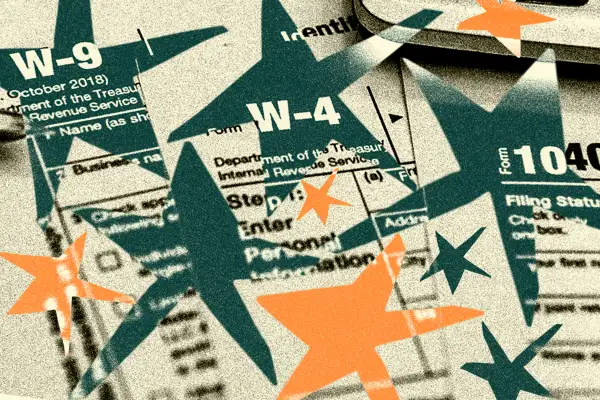Don't Wait 'Til April: Knock Out These 5 Tax Tasks Now

This article is part of Money's new-year checklist — a 10-step guide to crushing your financial goals in 2024 (and beyond). For expert tips on how to pay off debt, make resolutions you'll actually keep and more, read our cover story.
We know, we know — you're still recovering from the holidays, and the absolute last thing you want to think about while nursing a hangover is your tax return.
But April is a few short months away, and "January is not too early to start thinking about taxes," says Paul Miller, managing partner and certified public accountant at Miller & Company in New York City. The IRS recently announced that the 2024 tax season will formally begin on Jan. 29, and you'll be glad later that you prepared now.
Here are five things you can do to get ready for tax season.
1. Make your last quarterly tax payment
People who are self-employed, receive non-employer income like capital gains or alimony, or fall into a few other categories must pay estimated taxes four times a year. These payment periods roughly follow the quarters and usually fall on the 15th of each month. When the 15th falls on a holiday, Saturday or Sunday, the due date for estimated payments gets moved to the following business day.
The final quarterly payment for the 2023 tax year is Tuesday, Jan. 16, 2024. Alternatively, you can file your 2023 tax return by Jan. 31 and and pay your entire balance at that time.
2. Contribute to your IRA
While the deadline for 2023 401(k) contributions was Dec. 31, individual retirement accounts offer a little more flexibility.
Eric Bronnenkant, Head of Tax for Betterment, points out that you can still put money into your traditional or Roth IRA until April 15 and have it count towards your 2023 total. (For tax year 2023, taxpayers can't contribute more than $6,500 to all of their traditional and Roth IRAs. Those 50 or older can stash away $7,500.)
This due date may be weeks away, but there's a compelling reason for you not to delay: "The sooner you put your money into one of those retirement accounts, the sooner it starts being invested and growing tax-deferred — and, on the Roth side, potentially tax-free," Bronnenkant says.
The deadline to contribute to your health savings account, or HSA, for 2023 also falls on April 15.
3. Start collecting your tax paperwork
Surprise: You're going to need a whole lot of documents to file your taxes. Chief among them is Form W-2, a wage and tax statement that employers are supposed to issue to employees by Jan. 31.
Miller says you should also keep an eye out for Form 1099-G, which contains information about any unemployment compensation; Form 1098-T, which is a tuition statement; and Form 1098, which is a mortgage interest statement. You might also receive a 1099-INT from your bank (or other financial institution, like your brokerage) if you earned interest from your savings account or investments.
As these forms come in, set them aside in a safe place. Ideally, you'll have all the papers in hand by February. If not, you might need to track them down.
"Be thoughtful about all your different investments, retirement accounts, business activities," Bronnenkant adds. "[Try] thinking about what you've been involved in and assessing whether or not you are expecting a tax form [for it] — have you gotten that tax form?"
4. Take note of IRS policy changes
Miller says there aren't significant tax changes on tap for this year, but remember that the IRS made several inflation adjustments at the end of 2022 that'll affect your 2023 taxes. The standard deduction, for instance, rose to $13,850 for single filers and $27,700 for married couples filing jointly.
(Confusingly, these will also change for the 2024 tax year, increasing to $14,600 and $29,200, respectively.)
One of the buzziest tax changes in recent years concerns Form 1099-K, which payment apps and marketplaces were previously required to send to sellers who earned more than $20,000 in more than 200 transactions in a given year. The IRS initially planned to implement a law significantly reducing that threshold to $600 with no minimum transaction number for the 2022 tax year, but it called that plan off in December 2022 due to concern from tax pros. Among the (many) worries was the fact that millions of people were going to suddenly receive a new form and have to reconcile it on their taxes.
At the time, the IRS said it intended to put the law into effect for tax year 2023. Then, in late November, the agency announced it was "going to kick the can again," as Bronnenkant says.
The IRS is leaving the previous transaction thresholds ($20,000/200 transactions) in place for tax year 2023 and now hopes to phase in the law with a $5,000 benchmark for 2024. But Bronnenkant says challenges remain, including how to ensure transactions are being properly categorized, so stay tuned.
5. Consider getting an IP PIN
The IRS offers what's called an Identity Protection PIN, or IP PIN. It's a secret six-digit number that you can use to protect your identity while filing taxes. Basically, if someone tries to submit a tax return under your name but can't provide the correct IP PIN, the IRS will reject it.
Anyone with a Social Security number or Individual Taxpayer Identity Number can get an IP PIN, but you have to specifically request one. This process involves an identity verification process, so it's not instant — and therefore a task you should get out of the way well before tax time.
The online tool to get an IP PIN will open in mid-January; you may also be eligible to authenticate your identity in-person. See details on the IRS website.
More from Money:
Some Taxpayers Can File Federal Returns for Free Directly With the IRS

